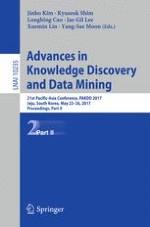2017 | OriginalPaper | Buchkapitel
Unsupervised Embedding for Latent Similarity by Modeling Heterogeneous MOOC Data
verfasst von : Zhuoxuan Jiang, Shanshan Feng, Weizheng Chen, Guangtao Wang, Xiaoming Li
Erschienen in: Advances in Knowledge Discovery and Data Mining
Aktivieren Sie unsere intelligente Suche, um passende Fachinhalte oder Patente zu finden.
Wählen Sie Textabschnitte aus um mit Künstlicher Intelligenz passenden Patente zu finden. powered by
Markieren Sie Textabschnitte, um KI-gestützt weitere passende Inhalte zu finden. powered by
